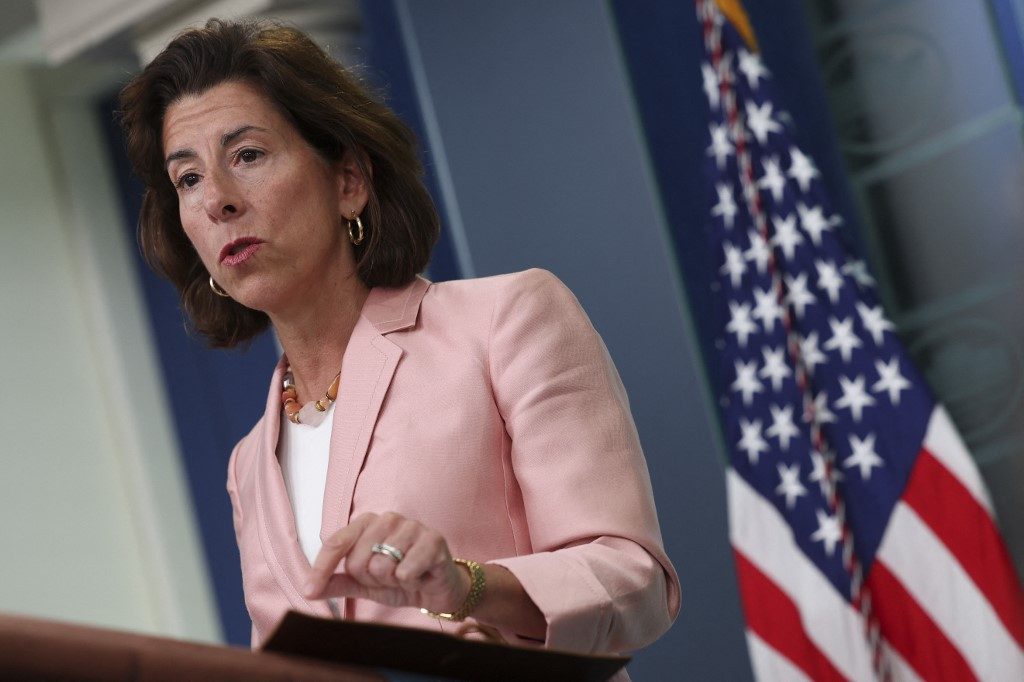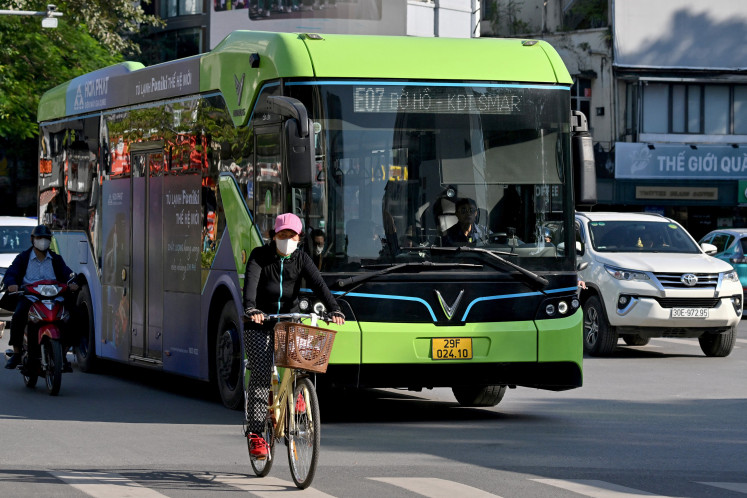Popular Reads
Top Results
Can't find what you're looking for?
View all search resultsPopular Reads
Top Results
Can't find what you're looking for?
View all search resultsUS to propose ban on Chinese software, hardware in connected vehicles
The Biden administration has raised serious concerns about the collection of data by Chinese companies on US drivers and infrastructure as well as the potential foreign manipulation of vehicles connected to the internet and navigation systems.
Change text size
Gift Premium Articles
to Anyone
 Commerce Secretary Gina Raimondo speaks during the daily press briefing at the White House on September 06, 2022 in Washington, DC. Secretary Raimondo spoke on the recent passage of the CHIPS and Science Act of 2022, legislation to encourage the construction of microprocessor manufacturing facilities in the United States.
(AFP/Kevin Dietsch/Getty Images)
Commerce Secretary Gina Raimondo speaks during the daily press briefing at the White House on September 06, 2022 in Washington, DC. Secretary Raimondo spoke on the recent passage of the CHIPS and Science Act of 2022, legislation to encourage the construction of microprocessor manufacturing facilities in the United States.
(AFP/Kevin Dietsch/Getty Images)
T
he US Commerce Department is expected on Monday to propose prohibiting Chinese software and hardware in connected and autonomous vehicles on American roads due to national security concerns, two sources told Reuters.
The Biden administration has raised serious concerns about the collection of data by Chinese companies on US drivers and infrastructure as well as the potential foreign manipulation of vehicles connected to the internet and navigation systems.
The proposed regulation would ban the import and sale of vehicles from China with key communications or automated driving system software or hardware, said the two sources, who declined to be identified because the decision had not been publicly disclosed.
The move is a significant escalation in the United States' ongoing restrictions on Chinese vehicles, software and components. Last week, the Biden administration locked in steep tariff hikes on Chinese imports, including a 100 percent duty on electric vehicles as well as new hikes on EV batteries and key minerals.
Commerce Secretary Gina Raimondo said in May the risks of Chinese software or hardware in connected US vehicles were significant.
"You can imagine the most catastrophic outcome theoretically if you had a couple million cars on the road and the software were disabled," she said.
President Joe Biden in February ordered an investigation into whether Chinese vehicle imports pose national security risks over connected-car technology - and if that software and hardware should be banned in all vehicles on US roads.
"China's policies could flood our market with its vehicles, posing risks to our national security," Biden said earlier. "I’m not going to let that happen on my watch."
The Commerce Department plans to give the public 30 days to comment before any finalization of the rules, the sources said. Nearly all newer vehicles on US roads are considered "connected." Such vehicles have onboard network hardware that allows internet access, allowing them to share data with devices both inside and outside the vehicle.
The department also plans to propose making the prohibitions on software effective in the 2027 model year and the ban on hardware would take effect in January 2029 or the 2030 model year. The prohibitions in question would include vehicles with certain bluetooth, satellite and wireless features as well as highly autonomous vehicles that could operate without a driver behind the wheel.
A bipartisan group of US lawmakers in November raised alarm about Chinese auto and tech companies collecting and handling sensitive data while testing autonomous vehicles in the United States.
The prohibitions would extend to other foreign US adversaries, including Russia, the sources said.
A trade group representing major automakers including General Motors, Toyota Motor, Volkswagen, Hyundai and others had warned that changing hardware and software would take time.
The carmakers noted their systems "undergo extensive pre-production engineering, testing, and validation processes and, in general, cannot be easily swapped with systems or components from a different supplier."
The Commerce Department declined to comment on Saturday. Reuters first reported, in early August, details of a plan that would have the effect of barring the testing of autonomous vehicles by Chinese automakers on US roads. There are relatively few Chinese-made light-duty vehicles imported into the United States.
The White House on Thursday signed off on the final proposal, according to a government website. The rule is aimed at ensuring the security of the supply chain for US connected vehicles. It will apply to all vehicles on US roads, but not for agriculture or mining vehicles, the sources said.
Biden noted that most cars are connected like smart phones on wheels, linked to phones, navigation systems, critical infrastructure and to the companies that made them.









